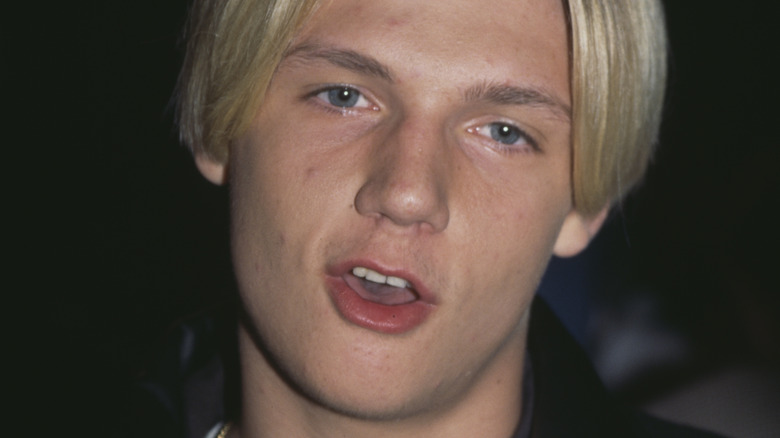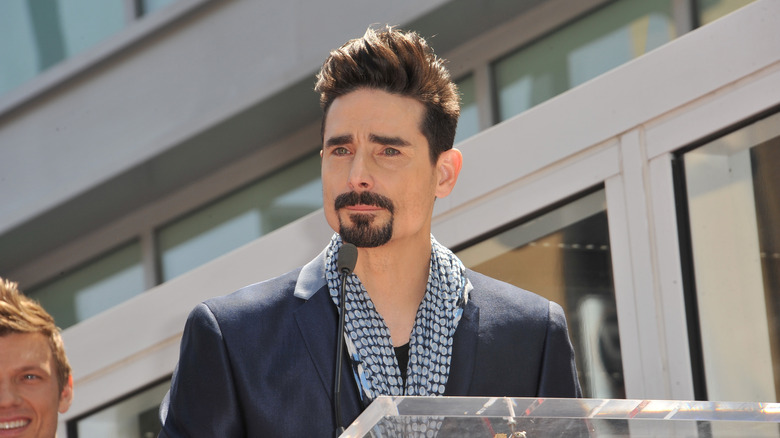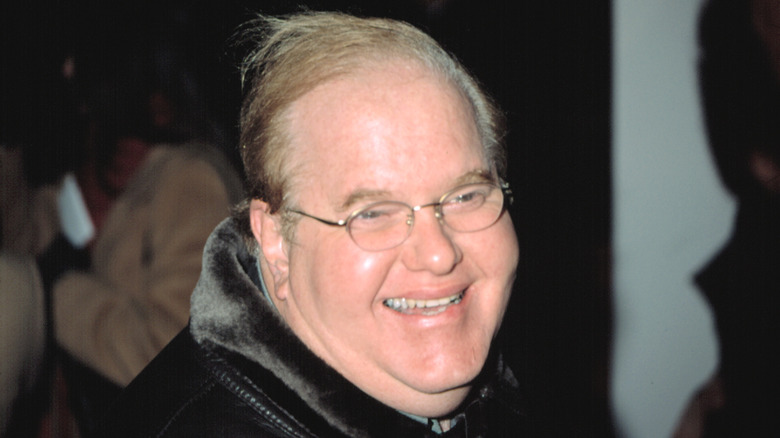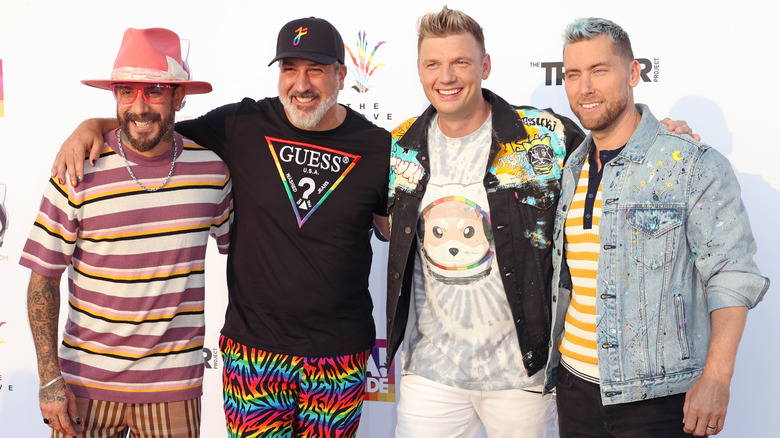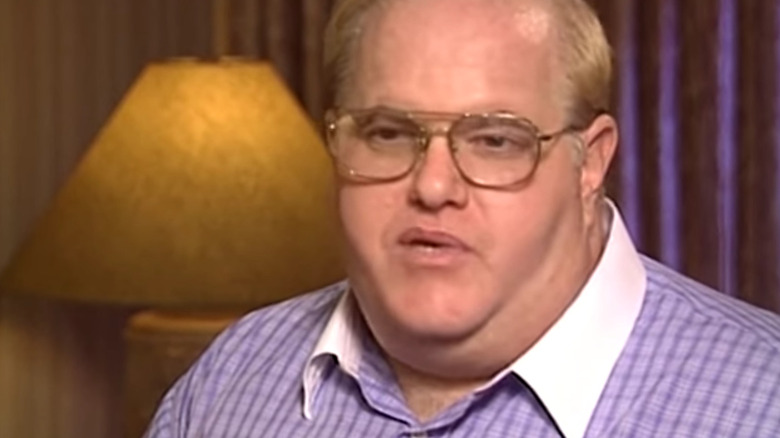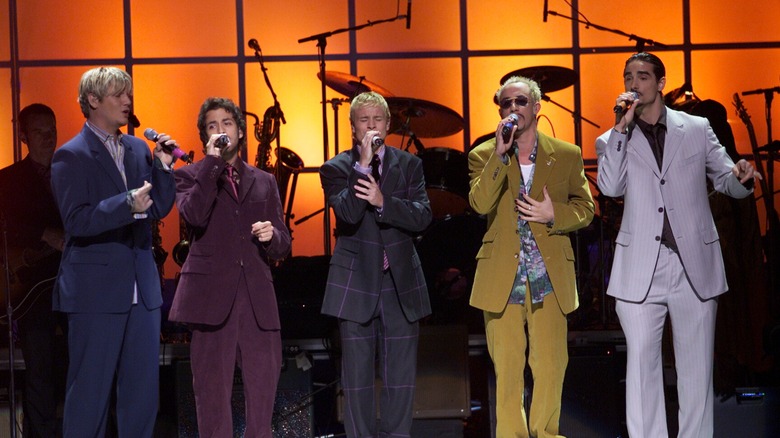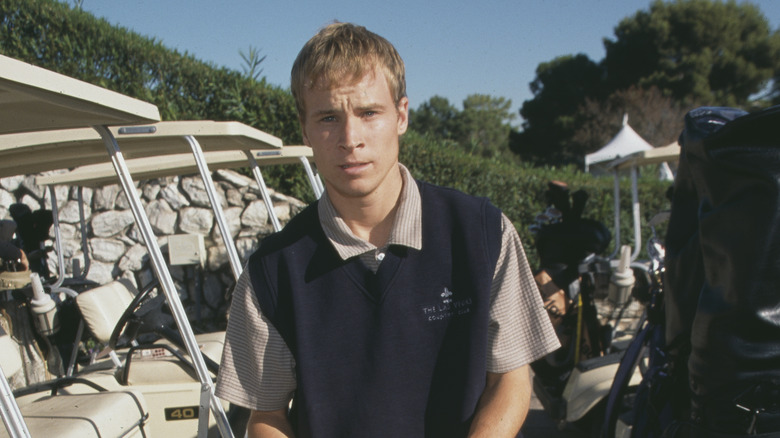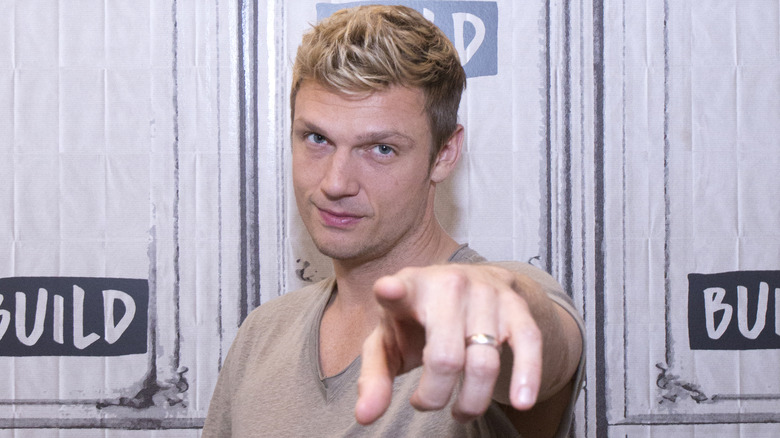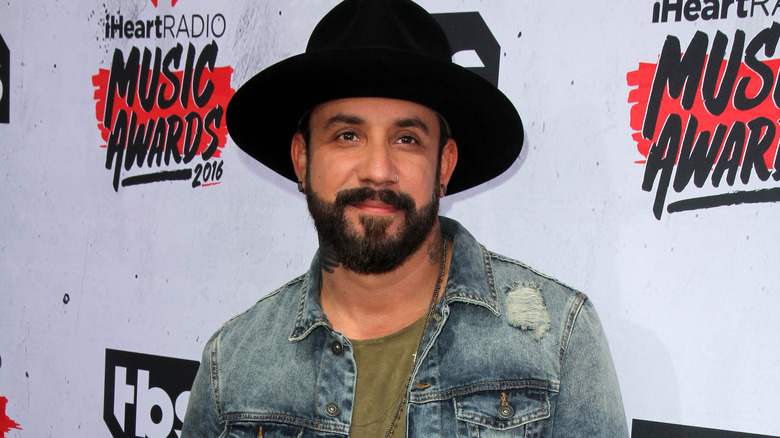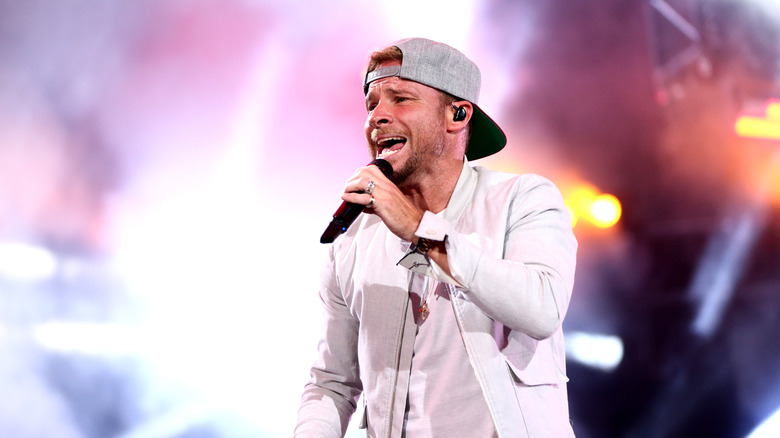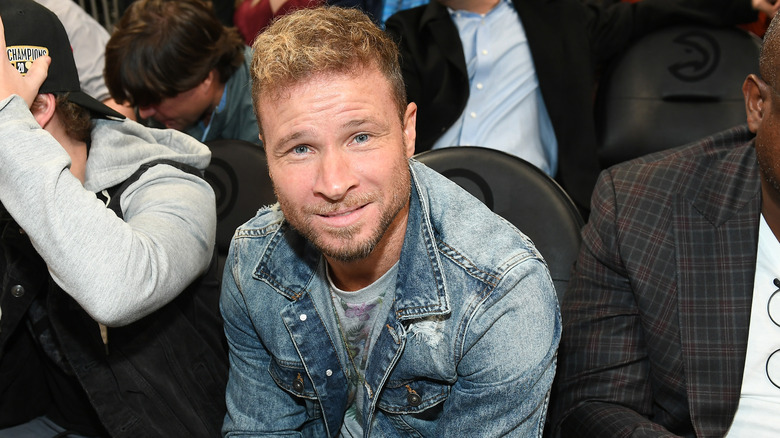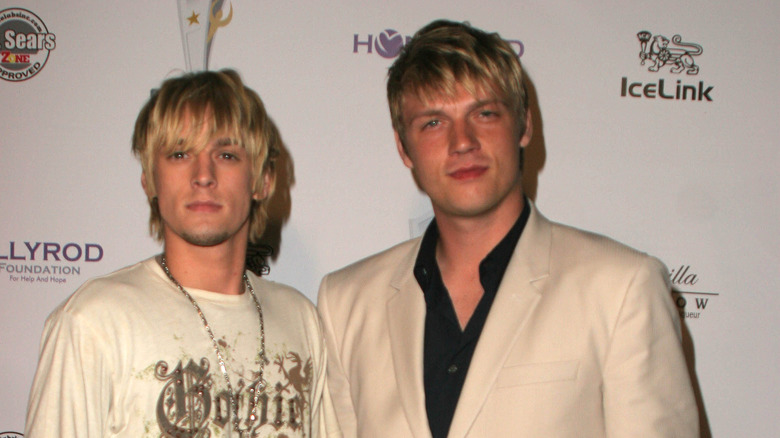Sad Stories About The Backstreet Boys
The Backstreet Boys were one of the biggest pop acts of the '90s, but there was a dark side to that success from the beginning. Singer Nick Carter, for example, claimed that he had his first drink at age two. "Family legend has it that when I was two years old, I crawled into one of the Yankee Rebel's liquor storage rooms where I was caught drinking for the first time," he wrote in his memoir, "Facing the Music." "My parents always laughed at that. I laughed too, for a while, and then I didn't laugh at it anymore."
This early experience sent Carter down a dangerous path. "I began drinking heavily in my teens," he wrote, "and then moved on to drugs at eighteen or nineteen, starting with marijuana and moving up to cocaine, Ecstasy, and prescription painkillers among other substances." The other band members warned him about the repercussions of all this partying, but his drinking later led to the star being charged with driving under the influence. In 2005, he was instructed to join a three-month program.
Sadly, Carter wasn't the only one in the Backstreet Boys who was struggling. Keep reading to find out more about the sad details that have haunted the boy band throughout the years.
If you or anyone you know is struggling with addiction issues, help is available. Visit the Substance Abuse and Mental Health Services Administration website or contact SAMHSA's National Helpline at 1-800-662-HELP (4357).
Kevin Richardson lost his dad at age 19
Kevin Richardson encountered tragedy at an early age when his father died from terminal colon cancer. Richardson had moved out of home just before his father became seriously ill. As he told SFGATE, the singer was performing dinner theater by night and working at Disney World during the day, playing characters like Tigger, Aladdin, Sebastian the Crab, and one of the Teenage Mutant Ninja Turtles. Then, in 1991, his family gave the 19-year-old some bad news.
"Cancer's something that we don't really talk about until it touches our life or our family," he observed in an interview with Sharon Osbourne. "When it was diagnosed, they think that [my dad] had it for about ten years. And once they found it, it was pretty much too late to do anything." The singer also spoke about his reaction to the news: "I was just like, numb. I was in shock." And he urged his fans to spread awareness about colon cancer, adding that the illness didn't receive enough attention.
"Seeing my father, a big, strong, burly man of 6'2" and 215 lbs., just deteriorate in a hospital bed — it was sad and unfortunate," Richardson later told Ability magazine. "I don't want anybody to have to go through that." He also explained that his dad had given him an appreciation for the outdoors and old singers like Dean Martin. "Our father was old-school," the singer reflected. "He was an outdoorsman, a construction worker, a fireman."
Ripped off by Lou Pearlman
Lou Pearlman was the man who brought the Backstreet Boys together, but he was also the chief villain in their story. As their manager, he kept them working hard throughout their early years as he pocketed a lot of money for himself. "I swear, in one year we had to have done five tours," Nick Carter told Rolling Stone. "The contracts weren't fair," Kevin Richardson added, explaining how Pearlman had taken advantage of them. "And we were kept on the road, and before you know it, two or three years and millions of dollars go by."
In 1999, they accused him of taking $10 million in revenue while the boys only got $300,000 between the five of them. As the Orlando Business Journal reported, the group turned from calling Pearlman a father figure to suing him for millions, revealing that they were unaware that he owned the website company they used. The ensuing legal battle lasted years, as it was revealed how Pearlman had been using his company Trans Continental Records in various ways to pay himself a much larger salary than any of the band.
Their feud with 'NSYNC was manufactured
The Backstreet Boys and 'NSYNC had one of the most notorious rivalries of the '90s. "We just thought we needed to be the best," 'NSYNC's Chris Kirkpatrick explained to Billboard, adding that he had bad blood with A.J. McLean, in particular. "I wanted to punch A.J.'s lights out for a little while," he admitted, revealing that they had dated the same girl and Kirkpatrick heard that McLean had been insulting him behind his back. "So I confronted him on it and wanted to kick his a**." They later made up over a beer. "I think boy band fights are in the same realm as hockey fights," the singer observed. "You fight when you're on TV, but then when you're not, you get a beer together."
But there was more to the story than just boy bands competing over chart sales and girls. As it turned out, Lou Pearlman actually managed both acts, which was news to the Backstreet Boys, and made a lot of money by pitting them against each other. "That hurt our feelings," Kevin Richardson told Rolling Stone. "Because for a while it was like, 'We're a family.' Then all of a sudden, 'It's business, guys, sorry.' We have nothing against... that group, personally. It was [Pearlman's] not being honest."
Lou Pearlman used them as part of his Ponzi scheme
The Backstreet Boys weren't the only ones Lou Pearlman ripped off: he used the success of his boy bands to lure investors into a massive Ponzi scam that made him hundreds of millions. As Billboard reported, some people lost their life savings by buying into his schemes, which were investigated by the FBI and FDIC. The scammer made $195 million through a phony savings program that didn't pay out returns, $70 million through shares in his various fake companies, and $126.7 million in fraudulent loans from the bank.
In 2008, he was sentenced to 25 years in prison on charges of conspiracy, money laundering, and making false statements during a bankruptcy proceeding. Defending himself to The Hollywood Reporter, Pearlman insisted he was better than Bernie Madoff. "He didn't have any real way to make money," the mogul claimed. "But I had the music. Backstreet Boys each made well over $50 million apiece. I, of course, got my piece, and it was very nice and very substantial." He died at age 62 in 2016 from cardiac arrest.
One of their touring crew was killed in 9/11
In 2001, the band experienced the national tragedy of 9/11 on a personal level when it was revealed that a set decorator for the Backstreet Boys tour had been killed on Flight 11 9/11. Daniel John Lee was on his way back to California to meet his newborn second child, because his wife was close to giving birth. The circumstances leading to him being on one of those planes were an unfortunate coincidence: thanks to A.J. McLean's stay in rehab for his alcoholism and drug addiction, the band's July performances in Boston had been pushed back to September.
The emotional band members performed at the tribute concert for New York after they found out that they had lost a member of their touring family, dedicating their appearance to Lee. Brian Littrell also revealed that his wife, Leighanne, was supposed to be on one of the flights, since she had a dentist appointment back in Los Angeles, but canceled because she felt uneasy. "I think we have lived many lives together on this journey. We are just blessed to have each other and I think I am blessed to have you in every way," he told Leighanne in an ET Online interview two decades later. "Don't get me crying."
Brian Littrell had open heart surgery
In 1998, Brian Littrell had to pause his chaotic touring schedule to have two and a half hours of open heart surgery. The singer, who needed the surgery to deal with a congenital hole in his heart, had to adjust to changes in his diet and busy lifestyle afterward. "Because at the age of 23, the doctors were even finding fatty deposits in one of my arteries," Littrell explained to MTV. "Because of all the McDonald's that we eat out on the road."
His mother, Jackie, told Rolling Stone that his congenital heart defect had been exacerbated during his time as a Backstreet Boy. "After six years of a schedule that was pretty much horrendous, he went for his annual checkup and the doctors noticed that his heart was getting quite large, like one for a 300-pound linebacker," she explained. Littrell delayed the surgery twice because of the band's tours, which he later regretted. "I mean, the saddest thing is that I scheduled open-heart surgery around my work schedule," he recalled. "It was like nobody really cared or felt that it was important, because the career was moving on."
He was back on stage after only eight weeks with the help of oxygen tanks. "It's not worth all that to me," the singer later reflected. "To be a star and not have my health? Sorry, but it's not worth it."
Nick Carter got sober after a scary diagnosis
Nick Carter reached a crucial moment in 2008 when he was diagnosed with cardiomyopathy after weakening his heart muscles for years with alcohol and drugs. As he told People, his doctors had hinted that something could be seriously wrong after he felt weak and experienced heart pain while touring Europe with the band. Carter was so scared that he went on a binge the night before he got his results. "I went out and just went nuts," he admitted. "I drank so much and I did a bunch of blow. I felt like I was trying to kill myself – because I didn't want to get the results."
Cardiomyopathy can lead to heart failure and increases the odds of dying early. "I don't want to die," Carter told People. "I don't want to be that person people read about and think, 'That's sad that he couldn't stop it and killed himself.'" So after he received his diagnosis, the singer decided to take better care of his health and get sober. "Working out definitely helped my self-esteem, and it definitely made it easier for me to kind of push it aside," he explained to Ellen Degeneres (via US Weekly). "I just started replacing drinking and the parties...with healthier things like sports, video games."
If you or anyone you know is struggling with addiction issues, help is available. Visit the Substance Abuse and Mental Health Services Administration website or contact SAMHSA's National Helpline at 1-800-662-HELP (4357).
A.J. McLean struggled with addiction
After first trying drugs on the set of the music video "The Call," A.J. McLean developed a substance abuse problem that lasted decades. "I was off the walls," the singer told "Good Morning America," admitting that his bandmates realized the severity of his addiction after he started missing rehearsals. The other boys held an intervention for him, leading to a rehab stay in 2001 that made headlines. "They basically broke into my house and they dumped ice water on me while I was passed out in my bed. Everybody started to catch on," McLean recalled. "I wasn't me anymore. I was just living a lie."
He went back to rehab multiple times over the years to try and tackle his addiction. Finally, the singer reached a turning point in 2019 while living in Las Vegas. "I was never sober. Not for a second," McLean admitted. "My wife could smell it on my breath and my youngest of my two daughters would not sit with me." He decided that he would commit to sobriety for the sake of his family, declaring: "There's too much to live for today. My beautiful children, my amazing wife, my career, my brothers. I've never felt more grounded that I do today."
If you or anyone you know is struggling with addiction issues, help is available. Visit the Substance Abuse and Mental Health Services Administration website or contact SAMHSA's National Helpline at 1-800-662-HELP (4357).
Brian Littrell's son has an unusual condition
Although Brian Littrell has his own history of health problems, he still found it extremely difficult to cope when his son Baylee was hospitalized at age six. As the singer told Access Online in 2009, it turned out that his son had Kawasaki Syndrome, a rare heart condition that affects the arteries. "Kawasaki, they call it the great mimicker, because it can mimic other diseases," Littrell explained. "We didn't really know what it was... turning into hand, foot, and mouth disease, then it turned into bacterial infections, which is a herpes virus. It kept escalating and escalating and before we left the hospital, we had asked the cardiologist for an echocardiogram on Baylee's heart."
When they received the results, they found that Baylee's coronary artery was extremely unusual. "It was a helpless situation," the Backstreet Boy recalled. Litrell was born with a heart murmer, so he had feared that his son would have a similar health crisis to his own — since Baylee started experiencing symptoms. "Baylee's had been complaining since October of having small little chest pains," the singer added.
But once he was diagnosed with Kawasaki, the doctors were able to treat him quickly. "He's doing well. He just graduated yesterday to his orange belt in karate. He missed a month of karate due to being low-key, but we're happy to have him back," Littrell revealed. "He's a normal six-year-old and not limited in any way other than being monitored with his coronary artery."
Brian Littrell almost lost his voice
In 2015, the band revealed that Brian Littrell had been on the verge of completely losing his singing voice. As AJ McLean told the HuffPost, Littrell was suffering from a nervous condition that meant his vocal cords wouldn't were disconnected from his brain. "He told us he had vocal tension dysphonia, which I had never heard of in my life," McLean recalled. "Immediately some of the guys were jumping on the internet, trying to look up stuff to see if they could help." Although the other band members were reportedly frustrated at times with his slow recovery, McLean saw the similarities between his own journey with addiction and Littrell's time in therapy. "But he's competitive and stubborn, he's a lion and he'll fight. Hats off to him, he's doing everything he can," McLean added. "I can hear his voice getting better."
Littrell also spoke to Cosmopolitan about his condition, comparing himself to a bodybuilder whose muscles are too large to allow flexibility. "If you talked to me probably four or five months ago, I wouldn't even be able to do the interview because I wouldn't have a voice to talk," he continued. "The dystonia and the dysphonia comes from nerves, from stress, from muscle tension, from kind of the lifestyle that we live ... But here we are, and I'm talking and that's great! It's much better than it was."
Nick Carter was devastated after the death of his brother
Nick Carter faced a devastating personal loss in 2022 when his brother Aaron Carter was found dead at age 34. "My heart is broken. Even though my brother and I have had a complicated relationship, my love for him has never ever faded," Nick wrote on his Instagram, insisting that he had always been rooting for his brother to overcome his struggles with addiction and mental illness. The singer also made it clear that he didn't hold anyone responsible for the tragedy. "I will miss my brother more than anyone will ever know. I love you Chizz," he added. "Now you can finally have the peace you could never find here on earth.... God, Please take care of my baby brother."
The band also dedicated their song "Breathe" to the former child star at one of their London concerts after the news broke. "The next song is about family," Kevin Richardson announced (via Rolling Stone). "Tonight, we've got a little bit of heavy hearts because we lost one of our family members yesterday." He told the audience that they wanted to give Aaron a quiet moment of recognition. "He's a part of our family, and we thank you guys for all your love, all your well wishes, and all your support," Richardson added.
If you or someone you know needs help with mental health, please contact the Crisis Text Line by texting HOME to 741741, call the National Alliance on Mental Illness helpline at 1-800-950-NAMI (6264), or visit the National Institute of Mental Health website.

